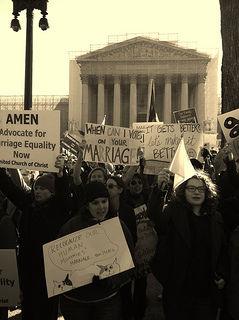The Supreme Court legalized gay marriage nationwide Friday morning with a landmark decision in the case of Obergefell v. Hodges.
The ruling, which was passed with a 5-4 vote and comes after decades of political controversy and debate, affirms that marriage between two people is a constitutional right. Citing the 14th Amendment, the Court ruled the U.S. Constitution bars state governments from denying a gay couple the right to a marriage license, according to the 14th Amendment.
Associate Justice Anthony Kennedy authored the majority opinion, and was joined by Associate Justices Stephen Breyer, Ruth Bader Ginsburg, Elena Kagan and Sonia Sotomayor in voting in favor of the decision.
In the majority opinion, Justice Kennedy wrote that all who seek marriage, regardless of the sex of their spouse, should be entitled to equal treatment.
“[Same-sex couples’] hope is not to be condemned to live in loneliness, excluded from one of civilization’s oldest institutions,” the opinion said. “They ask for equal dignity in the eyes of the law. The Constitution grants them that right.”
Dissenting from the majority opinion were Chief Justice John G. Roberts, with Associate Justices Samuel Alito, Antonin Scalia and Clarence Thomas making up the rest of the four votes against the decision.
In his dissenting opinion, Associate Justice Alito wrote that placing such an order on states could start the Court down an uncertain path in regards to Constitutional interpretation.,
“What it evidences is the deep and perhaps irremediable corruption of our legal culture’s conception of constitutional interpretation,” the opinion said.
Prior to the Court’s decision Friday, 37 states had authorized same-sex marriage, but most of the decisions were based on court rulings within the state that could have been overturned by the Supreme Court.
The full text of the opinions and ruling are available on the Supreme Court website. More details will follow, as the full extent of the ruling is still being understood.









